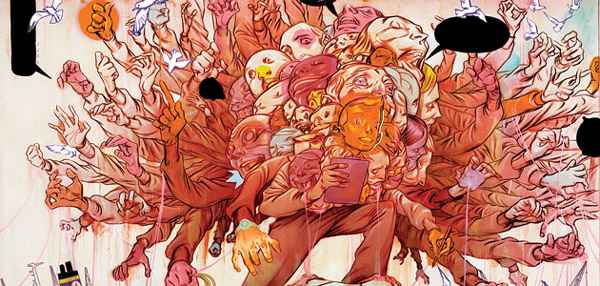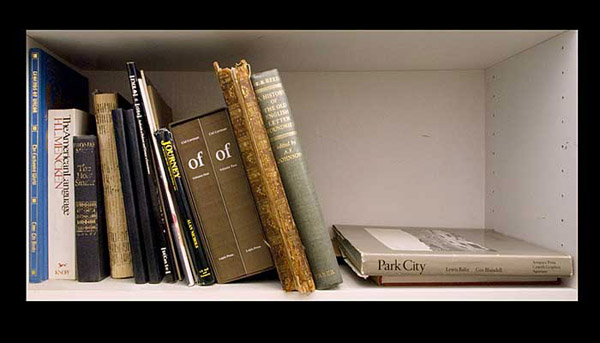 We are proud to announce that the brilliant media scholar and critic Siva Vaidhyanathan will be establishing a virtual residency here as the Institute’s first fellow. Siva is in the process of moving from NYU to the University of Virginia, where he’ll be teaching media studies and law. While we’re sad to be losing him in New York, we’re thrilled that this new relationship will bring our work into closer, more dynamic proximity. Precisely what “fellowship” entails will develop over time but for now it means that the Institute is the new digital home of SIVACRACY.NET, Siva’s popular weblog. It also means that next month we will be a launching a new website devoted to Siva’s latest book project, The Googlization of Everything, an examination of Google’s disruptive effects on culture, commerce and community.
We are proud to announce that the brilliant media scholar and critic Siva Vaidhyanathan will be establishing a virtual residency here as the Institute’s first fellow. Siva is in the process of moving from NYU to the University of Virginia, where he’ll be teaching media studies and law. While we’re sad to be losing him in New York, we’re thrilled that this new relationship will bring our work into closer, more dynamic proximity. Precisely what “fellowship” entails will develop over time but for now it means that the Institute is the new digital home of SIVACRACY.NET, Siva’s popular weblog. It also means that next month we will be a launching a new website devoted to Siva’s latest book project, The Googlization of Everything, an examination of Google’s disruptive effects on culture, commerce and community.
Siva is one of just a handful of writers to have leveled a consistent and coherent critique of Google’s expansionist policies, arguing not from the usual kneejerk copyright conservatism that has dominated the debate but from a broader cultural and historical perspective: what does it mean for one company to control so much of the world’s knowledge? Siva recently gave a keynote talk at the New Network Theory conference in Amsterdam where he explored some of these ideas, which you can read about here. Clearly Siva’s views on these issues are sympathetic to our own so we’re very glad to be involved in the development of this important book. Stay tuned for more details.
Welcome aboard, Siva.
Monthly Archives: July 2007
a little weekend reading
There’s an interesting post by Kenneth Goldsmith at Harriet, the blog of the Poetry Foundation about writing and the Web. Kenneth Goldsmith is probably best known – or not known? – to those who read if:book as the force behind UbuWeb; there was a fascinating interview with him recently at Archinect which provides a great deal of background on his work there. He’s also an accomplished poet; see, for example, his piece Soliloquy. In his post at Harriet, Goldsmith starts with a provocative statement: “With the rise of the web, writing has met its photography.” He argues that writing needs to redefine itself for the new parameters the Web offers; it’s a provocative argument, and one that deserves to stir up a broad discussion.
perspectives on distributed creativity

Assignment Zero, an experimental news site that brings professional journalists together with volunteer researcher-reporters to collaboratively write stories, has kicked off its tenure at Wired News by doing an extended investigation of “crowdsourcing.” Crowdsourcing is the latest internet parlance used to describe work traditionally carried out by one or a few persons being distributed among many people. I’ve always found something objectionable about the term, which is more suggestive of a business model than a creative strategy and sidesteps the numerous ethical questions about peer production and corporate exploitation that are inevitably bound up in it. But it’s certainly a subject that could use a bit of scrutiny, and who better to do it than a journalistic team composed of the so-called crowd?
It is in this self-reflexive spirt that Jay Rosen, a exceedingly sharp thinker on the future of journalism and executive editor of Assignment Zero (and the related NewAssignment.net), presents an interesting series of features assembled by his “pro-am” team that look at a wide variety of online collaboration forms. This package has been in development for several months (many of the pieces contain links back to the original “assignments” and you can see how they evolved) and there’s a lot there: 80 Q&A’s, essays and stories (mostly Q&A’s) looking at innovative practices and practitioners across media types and cultural/commercial arenas. From an initial sifting, it’s less an analysis than just a big collection of perspectives, but this is valuable I think, if for no other reason than as a jumping-off point for further research.
There are many of the usual suspects like Benkler, Lessig, Jarvis, Shirky, Surowiecki, Wales etc., but as many or more of the pieces venture off the beaten track. There’s a thought-provoking interview with Douglas Rushkoff on open source as a cultural paradigm, some stuff on the Wu Ming fiction collective (which is fascinating), a piece about Sydney Poore, a Wikipedia “super-contributor,” and some coverage of our work, an interview with McKenzie Wark about Gamer Theory and collaborative writing. There’s also an essay by one of the Assignment Zero contributors, Kristin Gorski, synthesizing some of the material gathered on the latter subject: “Creative Crowdwriting: The Open Book.”
All in all this seems like a successful test drive for an experimental group that is still inventing its process. I’m interested to see how it develops with other less “wired” subjects.
of shelves and selves
William Drenttel has a lovely post over on Design Observer about the exquisite information of bookshelves, a meditation spurred by 60 photographs of the library of renowned San Francisco designer, typographer, printer and founder of Greenwood Press Jack Stauffacher. Each image (they were taken by Dennis Letbetter) gives a detailed view of one section of Stauffacher’s shelves, a rare glimpse of one individual’s bibliographic DNA, made browseable as a slideshow (unfortunately, the images are not reassembled at the end to give a full view of the collection).

Early evidence suggests that the impulse toward personal mapping through media won’t abate as we go deeper into the digital. Delicious Library and Library Thing are more or less direct transpositions of physical shelves to the computer environment, the latter with an added social dimension (people meeting through their virtual shelves). More generally, social networking sites from Facebook to MySpace are full of self-signification through shelves, or rather lists, of favorite books, movies and music. Social bookmarking sites too bear traces of identity in the websites people save and tag (the tags themselves are a kind of personal signature). Much of the texture and spatial language of the physical may be lost, a new social terrain has opened up, one which we’re only beginning to understand.
But it’s not as though physical bookshelves haven’t always been social. We arrange books not only for our own conceptual orientation, but to give others who venture into our space a sense of our self (or what we’d like to appear as our self), our distinct intellectual algorithm. Browsing a friend’s thoughtfully arranged shelf is like looking through a lens calibrated to their view of the world, especially when those books have played a crucial role, as in Stauffacher’s, in shaping a life’s work. Drenttel savors the idiosyncrasies that inevitably are etched into such a collection:
I have seen many great rare book libraries…. But the libraries I most enjoy are working libraries, where the books have been used and cited and annotated – first editions marred with underlining, notes throughout their pages. (I will always remember the chaos of Susan Sontag’s library, where every book had been touched, read and filled with notes and ephemera.) The organization of a working library is seldom alphabetical…but rather follows some particular mental construct of its owner. Jack Stauffacher’s shelves have some order, one knows. But it is his order, his life.
Or, in Stauffacher’s own words:
Without this working library, I would have no compass, no map, to guide me through the density of our human condition.
six blind men and an elephant
Thomas Mann, author of The Oxford Guide to Library Research, has published an interesting paper (pdf available) examining the shortcomings of search engines and the continued necessity of librarians as guides for scholarly research. It revolves around the case of a graduate student investigating tribute payments and the Peloponnesian War. A Google search turns up nearly 80,000 web pages and 700 books. An overwhelming retrieval with little in the way of conceptual organization and only the crudest of tools for measuring relevance. But, with the help of the LC Catalog and an electronic reference encyclopedia database, Mann manages to guide the student toward a manageable batch of about a dozen highly germane titles.
Summing up the problem, he recalls a charming old fable from India:
Most researchers – at any level, whether undergraduate or professional – who are moving into any new subject area experience the problem of the fabled Six Blind Men of India who were asked to describe an elephant: one grasped a leg and said “the elephant is like a tree”; one felt the side and said “the elephant is like a wall”; one grasped the tail and said “the elephant is like a rope”; and so on with the tusk (“like a spear”), the trunk (“a hose”) and the ear (“a fan”). Each of them discovered something immediately, but none perceived either the existence or the extent of the other important parts – or how they fit together.
Finding “something quickly,” in each case, proved to be seriously misleading to their overall comprehension of the subject.
In a very similar way, Google searching leaves remote scholars, outside the research library, in just the situation of the Blind Men of India: it hides the existence and the extent of relevant sources on most topics (by overlooking many relevant sources to begin with, and also by burying the good sources that it does find within massive and incomprehensible retrievals). It also does nothing to show the interconnections of the important parts (assuming that the important can be distinguished, to begin with, from the unimportant).
Mann believes that books will usually yield the highest quality returns in scholarly research. A search through a well tended library catalog (controlled vocabularies, strong conceptual categorization) will necessarily produce a smaller, and therefore less overwhelming quantity of returns than a search engine (books do not proliferate at the same rate as web pages). And those returns, pound for pound, are more likely to be of relevance to the topic:
Each of these books is substantially about the tribute payments – i.e., these are not just works that happen to have the keywords “tribute” and “Peloponnesian” somewhere near each other, as in the Google retrieval. They are essentially whole books on the desired topic, because cataloging works on the assumption of “scope-match” coverage – that is, the assigned LC headings strive to indicate the contents of the book as a whole….In focusing on these books immediately, there is no need to wade through hundreds of irrelevant sources that simply mention the desired keywords in passing, or in undesired contexts. The works retrieved under the LC subject heading are thus structural parts of “the elephant” – not insignificant toenails or individual hairs.
If nothing else, this is a good illustration of how libraries, if used properly, can still be much more powerful than search engines. But it’s also interesting as a librarian’s perspective on what makes the book uniquely suited for advanced research. That is: a book is substantial enough to be a “structural part” of a body of knowledge. This idea of “whole books” as rungs on a ladder toward knowing something. Books are a kind of conceptual architecture that, until recently, has been distinctly absent on the Web (though from the beginning certain people and services have endeavored to organize the Web meaningfully). Mann’s study captures the anxiety felt at the prospect of the book’s decline (the great coming blindness), and also the librarian’s understandable dread at having to totally reorganize his/her way of organizing things.
It’s possible, however, to agree with the diagnosis and not the prescription. True, librarians have gotten very good at organizing books over time, but that’s not necessarily how scholarship will be produced in the future. David Weinberg ponders this:
As an argument for maintaining human expertise in manually assembling information into meaningful relationships, this paper is convincing. But it rests on supposing that books will continue to be the locus of worthwhile scholarly information. Suppose more and more scholars move onto the Web and do their thinking in public, in conversation with other scholars? Suppose the Web enables scholarship to outstrip the librarians? Manual assemblages of knowledge would retain their value, but they would no longer provide the authoritative guide. Then we will have either of two results: We will have to rely on “‘lowest common denominator'”and ‘one search box/one size fits all’ searching that positively undermines the requirements of scholarly research”…or we will have to innovate to address the distinct needs of scholars….My money is on the latter.
As I think is mine. Although I would not rule out the possibility of scholars actually participating in the manual assemblage of knowledge. Communities like MediaCommons could to some extent become their own libraries, vetting and tagging a wide array of electronic resources, developing their own customized search frameworks.
There’s much more in this paper than I’ve discussed, including a lengthy treatment of folksonomies (Mann sees them as a valuable supplement but not a substitute for controlled taxonomies). Generally speaking, his articulation of the big challenges facing scholarly search and librarianship in the digital age are well worth the read, although I would argue with some of the conclusions.
